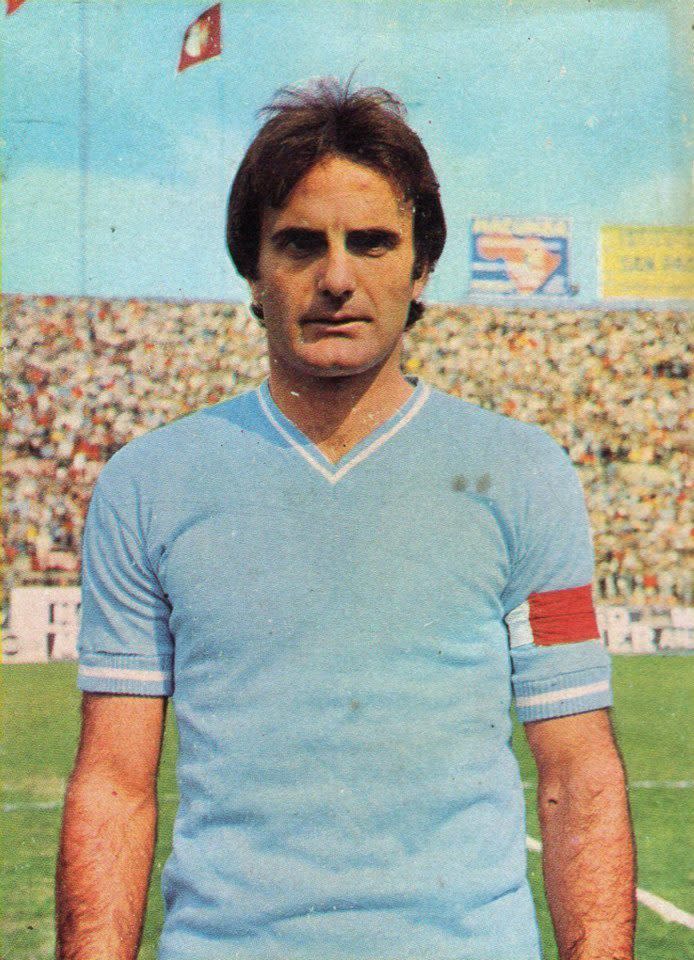Pino Wilson, Darlington-born footballer who took Lazio to glory in Italy – obituary

Pino Wilson, who has died aged 76, led Lazio to their first ever Serie A league title in 1974 and was regarded by the Italian club’s fans as its most totemic captain – even though he was half-English and born in Darlington, Co Durham.
Wilson’s father, Dennis, an iron and steel worker at Darlington Forge, served in Italy with the British forces during the Second World War. In Naples, he met and married Lina Di Francesca, and on October 27 1945, back in England, she gave birth, to a son, Joseph.
Winter in Darlington proved, however, too much of a trial for Lina Wilson, and when Joseph was six months old the family returned to Naples. There Dennis Wilson found work as a supervisor at a Nato base, while his son grew up to be a promising footballer.
When Joseph undertook his national service in Italy, he changed his name to its Italian form, Giuseppe, or Pino for short. Having abided by his mother’s decree that he should first finish his legal studies, he began to make his mark in the mid-1960s as a skilful if uncompromising defender with Internapoli, a side that played under the aegis of the giant Cirio food company.
Wilson turned out for the team more than 150 times and won a regional title in Serie D. Although he stood only 5ft 6in, his performances brought him to the attention of Lazio, and in 1969 he joined the more senior of Rome’s two major clubs, founded in 1900.

They were relegated in 1971, but with Wilson as captain they won promotion back to Serie A at the first attempt. For the next few years, rather like Leeds in the English league, Lazio revelled in shaking up the established order of things.
Although there were factions in the dressing room, Wilson was the team’s undisputed leader, and as sweeper set the tone for its free-flowing, hard-pressing style of play. This blended technical ability with an unyielding spirit that often spilled over into hot-tempered intimidation. If the former quality was embodied by the side’s playmaker, Luciano Re Cecconi, the latter found its outlet in striker Giorgio Chinaglia.
Like Wilson, Chinaglia had come from Internapoli, having grown up in Cardiff and first played professionally for Swansea. Known for his frequent confrontations with referees, managers and even teammates, Chinaglia became a cult hero to the hairy, rowdy crowds of the time.
The wider context to the period was the beginning of the so-called “years of lead”, an explosion of violence in Italian society that stemmed from the tensions caused by its rapid post-war industrialisation. Lazio became associated with neo-fascist fans, and stories of its players bringing guns to the training ground for high jinks burnished their outlaw image. A dinner with a visiting Arsenal side turned into a punch-up, while a match against Ipswich Town became a near-brawl that saw Lazio banned from European competition for a year.

In Italy, however, they went from strength to strength under the guidance of their manager Tommaso Maestrelli and marshalled by Wilson, who did not miss a match for four seasons. In 1972-73, Lazio lost the Serie A title to Juventus in the last game, and the following year they did claim the Scudetto, with Chinaglia finishing as top scorer. The club has won the title only once since, under Sven Goran Eriksson in 2000.
Wilson made his international debut shortly before the 1974 World Cup and went on to play in two of Italy’s three matches at the tournament. In the opening game, Chinaglia swore at the manager Ferruccio Valcareggi when substituted, leading to splits in the squad which hastened the side’s exit.
Things also deteriorated rapidly at Lazio as the team began to break up and Maestrelli died of cancer in 1976. Just over a month later, the midfielder Luciano Re Cecconi was shot dead when he and a friend staged a fake hold-up as a prank on a jeweller – who proved to have armed himself after previous raids.
In 1978, Wilson followed Chinaglia to the US to play for New York Cosmos alongside Franz Beckenbauer, Carlos Alberto and Dennis Tueart. The side won the NASL title and Wilson was voted man of the match in the deciding game.
He returned to Lazio, but in 1980 became a central figure in the betting scandal that became known as Totonero. This resulted from the friendship of several Lazio players, including Wilson, with a pair of small-time Rome businessmen who paid them to fix the outcome of certain matches.
When the results differed in fact from those supposedly guaranteed, the pair faced ruin because of the money they had wagered, as well as threats from gangsters who had become involved. The police began to investigate, and one Sunday in March 1980 officers waited on the touchline at matches to arrest players, including Wilson, as they came off.
The scandal widened to include other clubs, their presidents, and perhaps most famously the striker Paolo Rossi, who was to gain redemption by winning the 1982 World Cup. Lazio were relegated and Wilson banned for life, although this sentence was later commuted to three years. His career in Italy, nonetheless, came to an ignominious end, although he later had a spell at a club in Montreal. He had made almost 400 appearances for Lazio.
Wilson rehabilitated himself with a career as a television pundit, and when he died his coffin was taken to lie at Rome’s city hall on the Capitoline Hill; he was buried in the mausoleum where Tommaso Maestrelli and Giorgio Chinaglia also rest.
Pino Wilson is survived by his partner Daniela and by his son and daughter.
Pino Wilson, born October 27 1945, died March 6 2022

 Yahoo News
Yahoo News 
